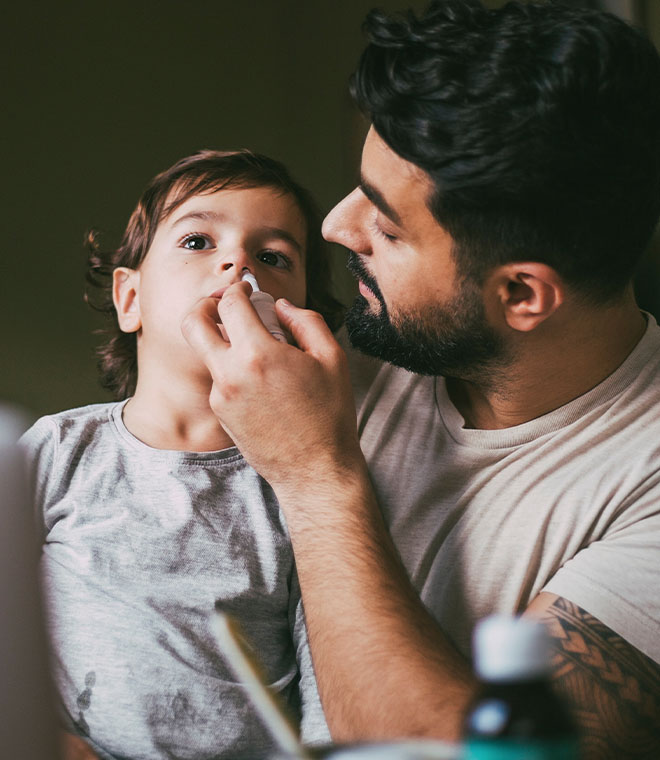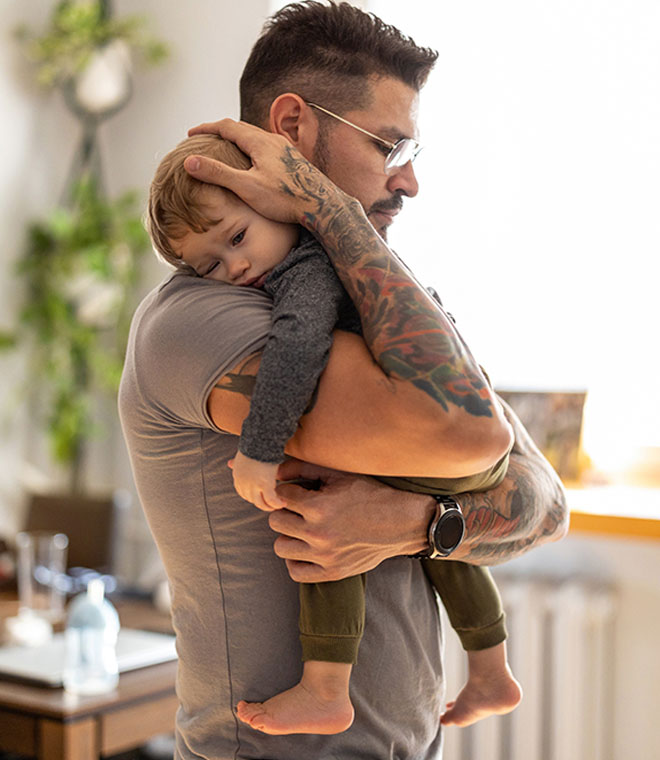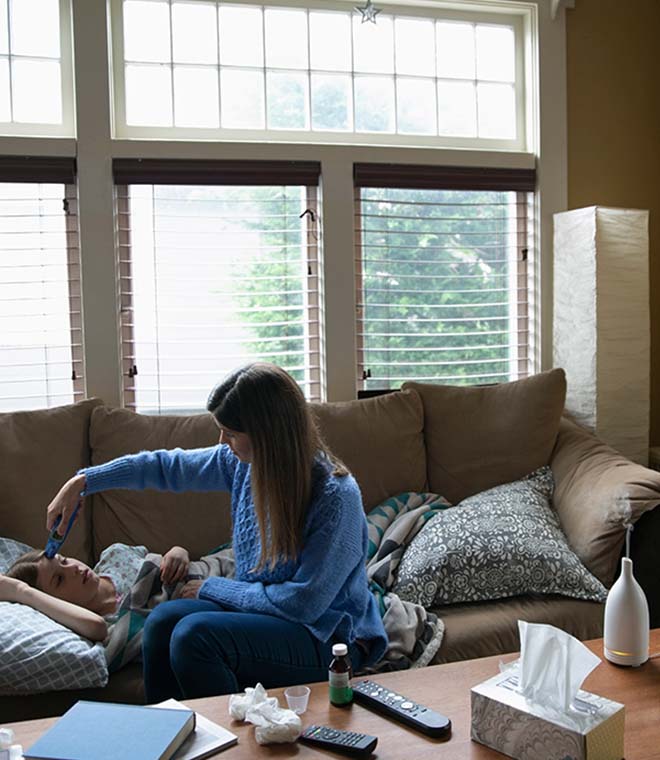Health
Cough and cold medicine for children
By Nancy Kupka, PhD, RN Jul 25, 2022 • 8 min.
Your little one is out of sorts—coughing, sneezing and just miserable.
You want to help, but you are not sure how safe it is to give them cold or cough medicine. Should you take them to see a healthcare provider? Do they need antibiotics? Are there alternative approaches available? What children's cold medicine or children's cough medicine should you use? What about cough medicine for babies?
Colds in children
The good news is that the common cold usually resolves by itself. For young children, their cold is at its worst on the second or third day, and then steadily improves over the next two weeks. Colds in older children and adolescents usually resolve in five to seven days, unless they have underlying lung disease, or they smoke or vape. Antibiotics and antivirals will not work to treat the common cold but, instead, could harm your child by contributing to antibiotic or antiviral resistance. The best thing that you can do is relieve your child's symptoms with loving care and home-based remedies. For children age 12 and older, sometimes over-the-counter (OTC) medications or prescription cough suppressants can help.
OTC cough and cold medicines for children
When seeking cough medicine for kids, many OTC and some prescription options are available. Still, the U.S. Food and Drug Administration (FDA) doesn't recommend any OTC medicines for cough and cold symptoms in children younger than 2 years old. That means there is no approved baby cold medicine or infant cold medicine. In fact, except for acetaminophen and nonsteroidal anti-inflammatory drugs (NSAIDs), OTC medications are not recommended for the common cold in children younger than 12 years of age. In addition, prescription cough medicines containing codeine or hydrocodone are not suggested for use in children younger than 18 years old.
Easing cold symptoms in children
Fortunately, there are many ways to make your child feel more comfortable when they have a cold. Learn how to treat your child's cold by managing their symptoms, including fever, aches and pains, stuffy nose and sore throat.
Fever, aches and pain
Acetaminophen or NSAIDs, like ibuprofen, are OTC pain relievers that also help with fever (defined as a temperature above 100.4°F or 38°C). Remember that fever is the body's way of fighting off infection, so unless your child's fever is very high or does not come down with medication, it will probably resolve on its own. If your child's fever is higher than 102°F or does not come down after a few doses of medication, call your healthcare provider.
Speak with your healthcare provider or pharmacist about the correct way to dose and administer any medication. For children, dosages are based on weight rather than age. Most drug manufacturers provide a dosing instrument, such as a syringe or a cup, marked with the correct measurements. Use the measuring tool that comes with the medication rather than using household spoons or tools from other medications. Keep all medications, including OTC medications, out of your children's reach. Data from the Pediatric Cough and Cold Safety Surveillance System (2009–2014) indicate that about two-thirds of all reported adverse events related to OTC cold and cough medications among children under age 12 were related to accidental, unsupervised ingestion.
To bring your child's fever down, you can also try tepid baths. The water temperature should be just a little cooler than usual. Be careful that the bath is not cold because that can be very uncomfortable for your child.
Stuffy nose
A stuffy nose and sniffles can be treated with saline or saltwater spray to loosen mucus. You can also sit with your child in an enclosed bathroom and run a hot shower. The mist from the shower will help loosen the mucus. For infants or younger children who cannot blow their nose to get rid of the loosened mucus, use a suction tool specifically designed for mucus removal. A vaporizer or humidifier near a child's bed can also decrease their dry nasal passages, but make sure to clean it well and often, according to the directions on the box. Failure to clean a vaporizer or humidifier often or thoroughly enough can expose your child to mold or additional bacteria.
Antihistamines, decongestants, antitussives, expectorants, mucolytics and combinations of these medications can be useful for relieving a stuffy nose in children 12 and older. The combination of antihistamines and decongestants may be more beneficial than either component alone. Intranasal/inhaled medications, including cromolyn sodium or ipratropium bromide, may also improve cold symptoms, but only use them sparingly as they may cause additional cold-like symptoms over time.
Sore throat
Sipping cold or warm beverages or eating ice cream or popsicles may help. Tea with honey or lemon is soothing, but avoid giving honey to children under 1 year old. Children over age 5 can also suck on hard candy for relief. Children 6 years and older can gargle with warm salt water made with ¼ to ½ teaspoon of salt per 8 ounces of warm water.
Keeping children hydrated is also important when they're sick. The old wives' tale about eating chicken soup when you have a cold really does help with hydration. So will water and ice chips. If you have older children, consider giving them sports drinks (not energy drinks), but know that water is the recommended liquid from the American Academy of Pediatrics. Children need enough water to keep hydrated, but excessive fluid intake is not necessary.
When to call your child's healthcare provider
Call your child's healthcare provider for any of the following symptoms. These may be a sign of something more serious than a cold:
- A fever in infants 2 months or younger, or a fever of 102°F or higher at any age
- Blue lips, labored or fast breathing, wheezing, ribs showing with each breath or shortness of breath
- Not eating or drinking with signs of dehydration, such as a sunken soft spot in infants or decreased urination
- Excessive crankiness or sleepiness
- Persistent ear pain
- A cough that lasts for more than three weeks
- Worsening symptoms
Clinically reviewed and updated June 2021.
Sources:
1. https://www.uptodate.com/contents/the-common-cold-in-children-management-and-prevention
2. Makris S, Johnston S. Recent advances in understanding rhinovirus immunity. F1000Res. 2018;7:F1000 Faculty Rev-1537. Published September 24, 2018. doi:10.12688/f1000research.15337.1.
3. https://www.fda.gov/consumers/consumer-updates/when-give-kids-medicine-coughs-and-colds
4. Tobias J, Green T, Cote C. Committee on Drugs, Section on anesthesiology and pain medicine. (2016) Codeine: Time to say "no". Pediatrics. 138(4).
5. Green J, Wang G, Reynolds K, Banner W, Bond G, et al. (2017). Safety Profile of Cold Medication Use in Pediatrics. Pediatrics. (139)
6. https://pediatrics.aappublications.org/content/139/6/e20163070.long
7. https://www.uptodate.com/contents/sore-throat-in-children-and-adolescents-symptomatic-treatment
8. https://www.aap.org/en-us/about-the-aap/aap-press-room/Pages/Kids-Should-Not-Consume-Energy-Drinks,-and-Rarely-Need-Sports-Drinks,-Says-AAP.aspx


